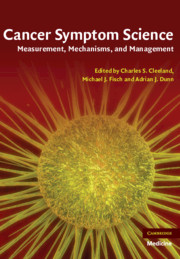Book contents
- Frontmatter
- Contents
- Contributors
- Foreword
- Credits and acknowledgements
- Section 1 Introduction
- Section 2 Cancer Symptom Mechanisms and Models: Clinical and Basic Science
- Section 3 Clinical Perspectives In Symptom Management and Research
- Section 4 Symptom Measurement
- Section 5 Government and Industry Perspectives
- Section 6 Conclusion
- Index
- Plate section
Foreword
Published online by Cambridge University Press: 05 August 2011
- Frontmatter
- Contents
- Contributors
- Foreword
- Credits and acknowledgements
- Section 1 Introduction
- Section 2 Cancer Symptom Mechanisms and Models: Clinical and Basic Science
- Section 3 Clinical Perspectives In Symptom Management and Research
- Section 4 Symptom Measurement
- Section 5 Government and Industry Perspectives
- Section 6 Conclusion
- Index
- Plate section
Summary
…For the secret of the care of the patient is in caring for the patient.
Francis W. PeabodyCancer…Symptom…Science. Simply reading the three words grouped together in the title of this book signals that we have indeed entered a new age in the way we will consider how to treat a person diagnosed with cancer. To those of us who have long advocated for integrative, evidence-based cancer care that recognizes, assesses, and then treats the whole person with cancer, this book is a welcome addition to the body of research that finally puts the biology of cancer in line with the real experiences of patients. And perhaps most importantly, this book now substantiates the case to all of us – health professionals, patients, and those who finance health care – for treating them accordingly. As this book so importantly points out, we now know how to measure the severity of symptoms that wreak havoc with a cancer patient's recovery and to examine what is happening biobehaviorally, even though it was not so long ago that this realm of research was relegated to an area of science considered to be “soft” and not easily quantifiable. Today, quality cancer care is ideally based not only on familiar, quantitative “hard” science, but on a marrying of the quantitative with the qualitative – the subjective experiences of people with cancer – to determine the best intervention for any one person or a population of people.
- Type
- Chapter
- Information
- Cancer Symptom ScienceMeasurement, Mechanisms, and Management, pp. xi - xviPublisher: Cambridge University PressPrint publication year: 2010



